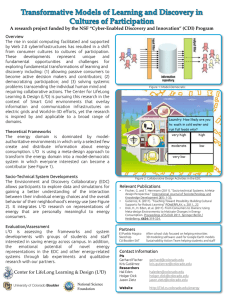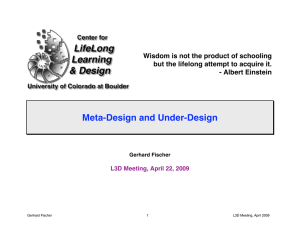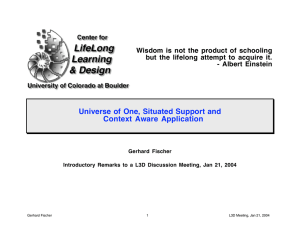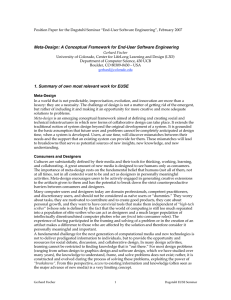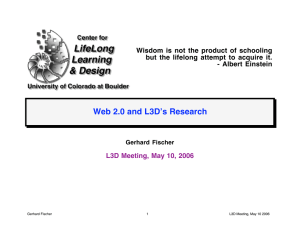Beyond “Couch Potatoes”: From Consumers to Designers and Active Contributors
advertisement
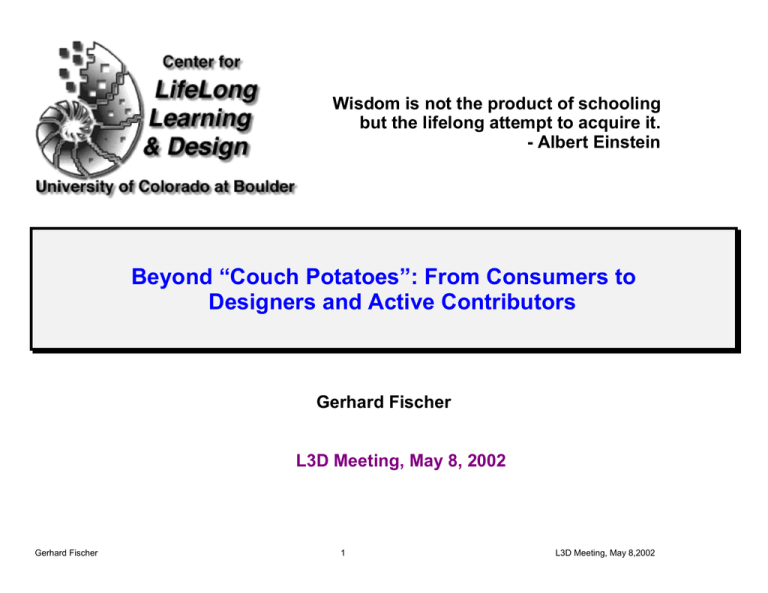
Wisdom is not the product of schooling
but the lifelong attempt to acquire it.
- Albert Einstein
Beyond “Couch Potatoes”: From Consumers to
Designers and Active Contributors
Gerhard Fischer
L3D Meeting, May 8, 2002
Gerhard Fischer
1
L3D Meeting, May 8,2002
An Example of a “Couch Potato” (source: Haderer in “Stern” Magazine)
Gerhard Fischer
2
L3D Meeting, May 8,2002
A Consumer Perspective / Mindset
• expert systems:
- reducing knowledge workers to giving yes/no answer to multiple choice questions (e.g.
MYCIN) Æ behaviorally unacceptable computational environments
• ease of use (within CHI): naive users, idiot-proof systems, “X for Dummies”
• keynote speech at CHI’95 (by Time Warner research director): basic challenge for CHI
community: design a remote control for 500 TV channels
Gerhard Fischer
3
L3D Meeting, May 8,2002
A Designer Perspective / Mindset
“The experience of having participated in a problem
makes a difference to those who are affected by the solution.
People are more likely to like a solution
if they have been involved in its generation;
even though it might not make sense otherwise” — Horst Rittel
• putting owners of problems in charge
• competent practitioners worrying about tasks; motivated to contribute and to create
excellent products
• personal growth (low threshold and high ceiling)
• independence from “high-tech scribes” (unself-concious cultures of design; Alexander)
• control and conviviality (Illich)
• communities of practice (CoPs) and communities of interest (CoIs) Æ transition from a
large contribution by a few to a small contribution by many (decentralization)
Gerhard Fischer
4
L3D Meeting, May 8,2002
Designers Mindsets and Convivial Tools
• convivial tools and systems (Illich 1973): “allow users to invest the world with their
meaning, to enrich the environment with the fruits of their vision and to use them for the
accomplishment of a purpose they have chosen”
• conviviality is a dimension that sets computers apart from other media that are passive
and cannot conform to the user’s own tastes and tasks
• passive technologies offer some selective power, but they cannot be adapted and
extended in ways that the designer of the systems did not directly foresee
• convivial systems encourage
- users to be actively engaged in generating creative extensions to the artifacts given to them
and the organizations they are involved in
- have the potential to break down the counterproductive barrier between programming and
using programs (users become co-developers)
• claim: most current computer systems are not convivial Æ software is not “soft”
Gerhard Fischer
5
L3D Meeting, May 8,2002
Beyond Binary Choices — The Consumer/Designer Spectrum
• claims:
- there is nothing wrong being a consumer (watching a tennis match, listening to a
concert, ...)
- the same person is and wants to be a consumer in some situations and in others a
designer
- consumer / designer is not an attribute of a person, but of a context
• problems:
- someone wants to be a designer but is forced to be a consumer (personally
meaningful activities)
- someone wants to be a consumer but is forced to be a designer (personally
irrelevant activities)
Gerhard Fischer
6
L3D Meeting, May 8,2002
Beyond Binary Choices — The Consumer/Designer Spectrum
Consumer <---------------------------------------------------------------------> Designer
passive consumer
active consumer
end-user
user
power users, local developers
domain designer
meta-designer
Gerhard Fischer
7
L3D Meeting, May 8,2002
Comparing Consumer and Designer Roles
activity
consumer
designer
watch; use; listen; surfe;
construct; change; make your
own waves;
access
informed participation
learning effort
small
large
depth of
understanding
shallow
deep
engagement
normal
substantial
mismatch
wanting to be a designer
in personally relevant
activities
wanting to be a consumer in
personally irrelevant activities
rewards
none, because no
tangible artifact is
constructed
personal involvement; peer
recognition, social capital
Gerhard Fischer
8
L3D Meeting, May 8,2002
High-Tech Scribes, Power Users, and Knowledge Workers in
Domains
t oo l
do main
knowled ge
knowled ge
high-tech scribe
power-users
knowledge workers
boundary objects / bridge objects
Gerhard Fischer
9
L3D Meeting, May 8,2002
Technology and Media Support for Consumer and Designer Roles
• Consumer Roles
-
TV
lecture (students in classrooms)
citizens
printed version of the Boulder County Healthy Communities Initiative (BCHCI)
indicator report
- Web (M1 model)
• Designer Roles
-
Gerhard Fischer
DODEs
Envisionment and Discovery Collaboratory
PitaBoard
Dynasite / livingOM / Swiki
Agentsheets / Visual AgenTalk / Behavior Exchange
Web (M3 model)
10
L3D Meeting, May 8,2002
Indicator—Vehicle Miles Traveled (from the printed version)
Gerhard Fischer
11
L3D Meeting, May 8,2002
Printed Publication of the Indicator Report (1998)
• indicators project
- over several years developed a set of indicators to measure the health of the county along
various dimensions as well as means to gather and track that information
- the report has been written to make the information understandable to the general public,
- 10,000 copies have been distributed
- response to the report has been mostly passive, and the desired effect of encouraging
involvement has not been achieved
• claims: the report has not fostered participation because
- the information in the report is presented in static format
- it is not clear to citizens how to contextualize the data to their lives and how they can
become more involved
Gerhard Fischer
12
L3D Meeting, May 8,2002
Living Information Environments through Informed Participation
• exploration of underlying data, assumptions, projections
• correlation among data/indicators (e.g., how is traffic related to job market, housing
affordability)
• extensible argumentation about interpretation, assumptions, projections, and possible
interventions
• ongoing inclusion of new data
• links to:
- alternate data sources
- discussion forums
- simulations representing various potential outcomes of current trends or trends based on
potential changes in behavior
• ranking relative importance of indicators
• creation of new indicators
Gerhard Fischer
13
L3D Meeting, May 8,2002
Challenges Created by Informed Participation
Issue
Challenge
Supporting Substrate
design is an argumentative
process
exploring design alternatives
perspective mechanisms
(WebGuide)
symmetry of ignorance
all stakeholders contribute
end-user modification
actively as sources of power
substrates (Visual
for mutual learning
AgenTalk, DynaSites)
incorporating an emerging
design in a set of external
structures
record the design process and
the design rationale
creating low-cost modifiable
models
creating shared understanding; emergent integrated hardhaving a conversation with
and software
the materials
environments (EDC,
PitaBoard, CoVE)
design artifacts are mute
increasing the “back-talk” of
the artifacts
critics, LSA
using simulations to engage
in “what-if” games
replace anticipation of the
consequences of our
assumptions by analysis
AgentSheets, Swiki
Gerhard Fischer
14
organizational memory
(Dynasite, livingOM)
L3D Meeting, May 8,2002
WWW: From Broadcast to Collaboration Medium
Web Master
Delegation
Feedback
(via email
or forms)
Distributed
Collaboration
Seed
World Wide Web
World Wide Web
Web Users
M1
M2
M3
The Web as Broadcast Medium
Broadcast with Feedback
Evolutionary and Collaborative Design
Gerhard Fischer
15
L3D Meeting, May 8,2002
Duality between Learning and Contributing
End-User Modifiability,
End-User Programming
Learning on Demand
Gerhard Fischer
16
L3D Meeting, May 8,2002
Consumers / Designers ÅÆ Social Creativity
• a designer culture is a necessary, but not a sufficient condition/requirement for social
creativity
• Unproven Claims (Brown, J. S. (1991) "Research That Reinvents the Cooperation," Harvard
Business Review, Jan/Feb 1991, pp. 102-111)
- p 106: “technology will become so flexible that users will be able to customize it ever-more
precisely to meet their particular needs — a process that might be termed “mass
customization”
- p 108: “provide people with easy-to-use programming tools so they can customize the
information systems and computer applications that they work with”
• high-tech scribes: putting owners of problems in charge Æ unself-concious culture of
design:
- computing today: the world is separated into a population of elite scribes and a much larger
population of intellectually disenfranchised computerphobes (similar to the written word
before the printing press)
- people can not do what they want until they get the attention of an expert who will tell them
how they can do it
Gerhard Fischer
17
L3D Meeting, May 8,2002
Social Creativity: Only possible among Humans with a
Designer Mindset?
• “collective comprehensiveness through overlapping patterns of unique narrowness” Æ
Campbell, D. T. (1969) "Ethnocentrism of Disciplines and the Fish-Scale Model of Omniscience." In
M. Sherif & C. W. Sherif (Eds.), Interdisciplinary Relationships in the Social Sciences, Aldine
Publishing Company, Chicago, pp. 328-348.
• “none of us is as smart as all of us” Æ Bennis, W. & Biederman, P. W. (1997) Organizing
Genius: The Secrets of Creative Collaboration, Perseus Books, Cambridge, MA.
“Linux was the first project to make a concious and successful effort to use the entire
world as a talent pool” Æ Raymond, E. S. & Young, B. (2001) The Cathedral and the Bazaar:
Musings on Linux and Open Source by an Accidental Revolutionary, O'Reilly & Associates,
Sebastopol, CA.
Gerhard Fischer
18
L3D Meeting, May 8,2002
Meta-Design
• meta-design = how to create new media that allow users to act as designers and be
creative (Æ “underdesign” — example: American constitution)
• why meta-design?
- design as a process is tightly coupled to use and continues during the use of the system
- address and overcome problems of closed systems
- transcend a “consumer mindset”
• impact of meta-design
- “if you give a fish to a human, you will feed him for a day — if you give someone a fishing
rod, you will feed him for life” (Chinese Proverb)
- can be extended to: “if we can provide someone with the knowledge, the know-how, and
the tools for making a fishing rod, we can feed the whole community”
Gerhard Fischer
19
L3D Meeting, May 8,2002
Meta-Design Aspects in the EDC: Closed versus Open Systems
• user control:
- end-user modifiability
- conviviality (independence of high-tech scribes)
- ownership (putting owners of problems in charge)
• example for a closed system: SimCity — too much crime
- solution supported: build more police stations (fight crime)
- solution not supported: increase social services, improve education (prevent crime)
• important goal of EDC:
- create end-user modifiable versions of SimCity
- background knowledge can never be completely articulated because the world changes
Gerhard Fischer
20
L3D Meeting, May 8,2002
Design and Use Time
key
system developer
user (representative)
end user
time
use
time
design
time
Gerhard Fischer
21
L3D Meeting, May 8,2002
Difference between Printed and Computational Media
Consumer <-----------------------------------------------------------------> Designer
TV
Printed Media
Current Computational Media
Envisioned Computational Media
• print media: a fixed context is decided at design time
• computational media: decision at use time can take advantage of contextual factors
only known at use time (e.g., dynamic forms, dynamic websites, ......)
• challenge: articulation of contextual factors at use time (about tasks, users, social
systems,.....) — end-user programming, specification sheets, usage data, .......
Gerhard Fischer
22
L3D Meeting, May 8,2002
Meta-Design: Beyond Participatory Design
• design for change Æ seeding, evolutionary growth, reseeding (SER) model
• “underdesign”
- create opportunities for design at use time
- create design opportunities rather than design solutions
• participatory design among CoIs Æ use their own creativity to create environments
(at design time) in which users can be creative and act as designers (at use time)
Gerhard Fischer
23
L3D Meeting, May 8,2002
The Ubiquity of the Consumer/ Designer Perspective
• learning and education
- deschooling society (Illich): “schools and universities = reproductive organ of a consumer
society” and “people who are hooked on teaching are conditioned to be customers for
everything else”
- courses as seeds (rather than finished products) become a viable concept
• concerned citizens: “taking control of our lives” Æ Envisionment and Discovery
Collaboratory
- computational environments and reality should not be build by experts, with everyone
merely interacting with it
- “limited technical acumen” Æ is not a trait determined by someone’s DNA like eye color; it
is a convenient label employed by those who do not wish to expand the energy to enrich
the technical acumen of their community
Gerhard Fischer
24
L3D Meeting, May 8,2002
Motivation and Rewards
• what will make humans want to become designers/active contributors over time? Æ
claim: serious learning does not have to be unpleasant but can be personally
meaningful, empowering, engaging and fun
• what will make humans want to share? Æ requires: culture change, community
knowledge bases, distributed memories
• who is the beneficiary and who has to do the work?
Gerhard Fischer
25
L3D Meeting, May 8,2002
Mismatch Problem in Teaching and Learning
Teacher
Student
Example
authority (“sage on the
stage”)
dependent, passive
lecture without questions,
drill
{expert, teacher-run}
{consumer}
motivator and facilitator
interested
lecture with questions,
guided discussion
delegator
involved
group projects, seminar
coach/critic (“guide on the self-directed, discoveryside”)
oriented
{meta-designer}
{designer, student-run}
self-directed study group,
apprenticeship,
dissertation
• major mismatches :
- dependent, passive learners take courses with non-directive teachers, and
- self-directed, discovery-oriented active learners take courses with directive, authoritarian
teachers.
Gerhard Fischer
26
L3D Meeting, May 8,2002
Assessment
• role of professional designers
- division of labor
- claim: the “average” person does not want to build their own houses, design their own car,
write their own software system / sorting routine
- all people do not have the time to participate equally fully in all aspects of the political
system in order to become fully engaged and informed
Æ intermediaries
• users as designers
- one of the major roles for new media and new technologies is not to deliver information to
individuals, but to provide the opportunity and resources for social debate and discussion
- a departure from HCI thinking Æ to look at users not simply as objects of study, but as
active agents within the design process itself
- full participation from users Ærequires training and active cooperation, not just token
representation in meetings or on committees
Gerhard Fischer
27
L3D Meeting, May 8,2002
Conclusions
• differentiate between consumers and designers by questions asked / problems
perceived:
- Consumer: Is a new future coming? (for example: in developing the new media of the
future, the social scientists / humanists should not be content with spectators and
Cassandra roles)
- Designer: How can we invent and create a new future?
- being a consumer or a designer is a mindset
• Claims:
- the future is not out there to be “discovered”, but it has to be invented and designed
- the question: who will design the future? (we should not be content with reflecting on and
evaluating designs developed by other communities, e.g., Hollywood)
- Marshall McLuhan: “If we understand the revolutionary transformations caused by new
media, we can anticipate and control them; but if we continue in our self-induced subliminal
trance, we will be their slaves.”
Gerhard Fischer
28
L3D Meeting, May 8,2002
